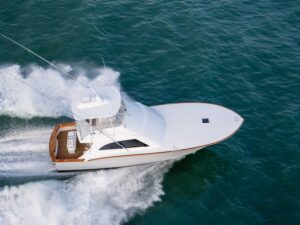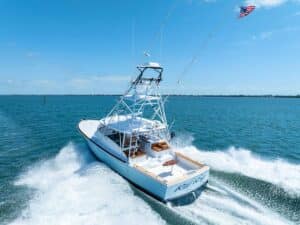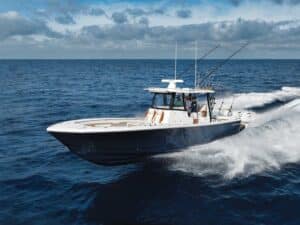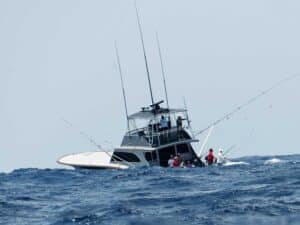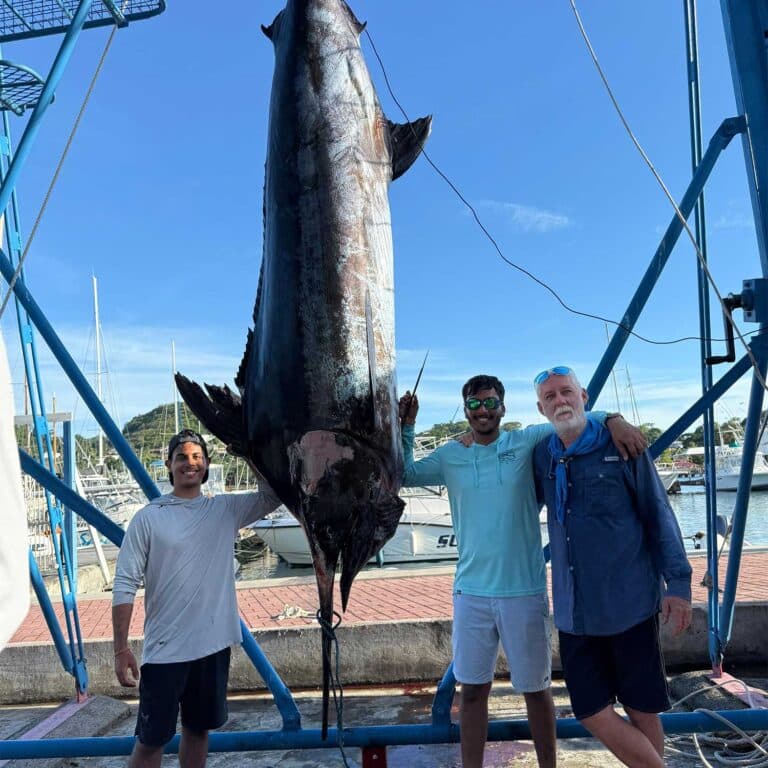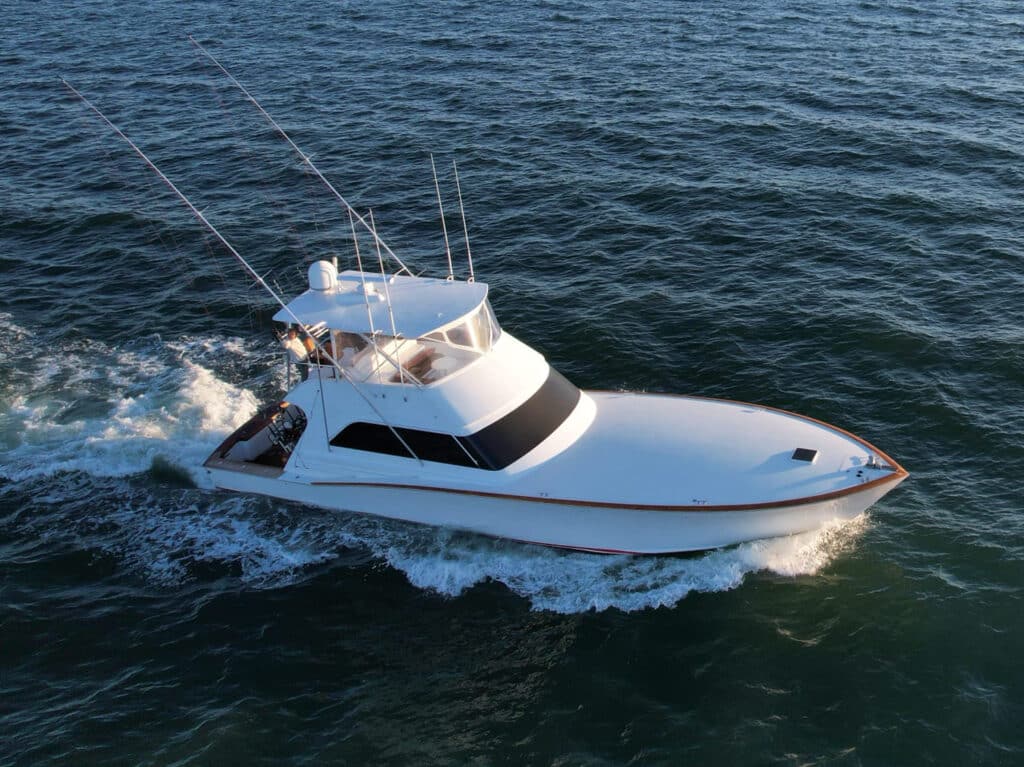
Special delivery: Sign up for the free Marlin email newsletter. Subscribe to Marlin magazine and get a year of highly collectible, keepsake editions – plus access to the digital edition and archives.
Usually, boating experiences invoke the most positive thoughts. The memories of our best catch, great times with friends and family, or perhaps we might be overcome by a feeling of freedom and relaxation that comes only from being on the water. All of our normal worries and fears get buried because the positivity of a day offshore often trumps them. Just another reason why we love it—a temporary respite from the day-to-day.
However, serious issues can be lurking around every corner, especially on a boat. And being prepared is just something that is baked into the boating equation. As captains, we need to be able to keep an issue from becoming a disaster, and I have two major fears when it comes to boats: lightning strikes and electrical fire. While neither is completely within my control, I can—and should—always be prepared for the worst.
The Story
One of my worst fears was realized on December 6, 2021, at 2 a.m., when my shore- power cord caught my boat, Euphoria, on fire in the Bahamas. Fortunately, my mate woke up to the smell of smoke and yelled, “Ricky, fire!” We both hurled ourselves up the companionway stairs into the salon to see flames in the aft starboard corner of the cockpit. For some reason, the boat’s smoke detectors never went off, which was strange to me because it sure seemed like there was plenty of smoke in the salon to trigger the alarm; and later, the smoke detectors tested perfectly.
I had six fire extinguishers placed throughout the cabin and a fire-suppression system in the engine room, but the flames were outside. We immediately grabbed multiple handheld fire extinguishers and proceeded to hit the flames with them. The extinguishers suppressed them to some degree, but not enough. Luckily, I had installed a high-pressure, backup 24-volt freshwater pump and an even-higher gallon-per-minute 24-volt raw-water washdown pump two months before the incident. Because the power was out due to the flames incinerating the power cord, we flipped on the breakers for these battery-powered pumps and went to work spraying down the fire.
The hoses were able to hold the fire in place and keep it from spreading any farther forward, but shortly after, I was able to get to the dock hose to spray that on the fire as well. After fighting for over an hour and a half, the fire was finally out. We had undoubtedly saved the boat, the boats next to us, and likely ourselves.
Smoke damage was the worst of it, but the boat was in good enough condition to be brought stateside under its own power and get repaired. The immediate damages to the cockpit where the fire was concentrated included burnt wood and fiberglass, charred teak, and plenty of paint and cosmetic damage throughout the cockpit and starboard side. This was all exceptionally heartbreaking because I had just retrofitted this boat less than two years ago and thought that I wouldn’t need to spend considerable amounts of time and money in the boatyard for the next few years. Aside from that, I knew that my winter plans were over because a routine inspection indicated that it was going to be a few months before the boat would be completely repaired. The worst part, as a boat owner, was that I was going to have to do something I had hoped I would never have to do: make an insurance claim.
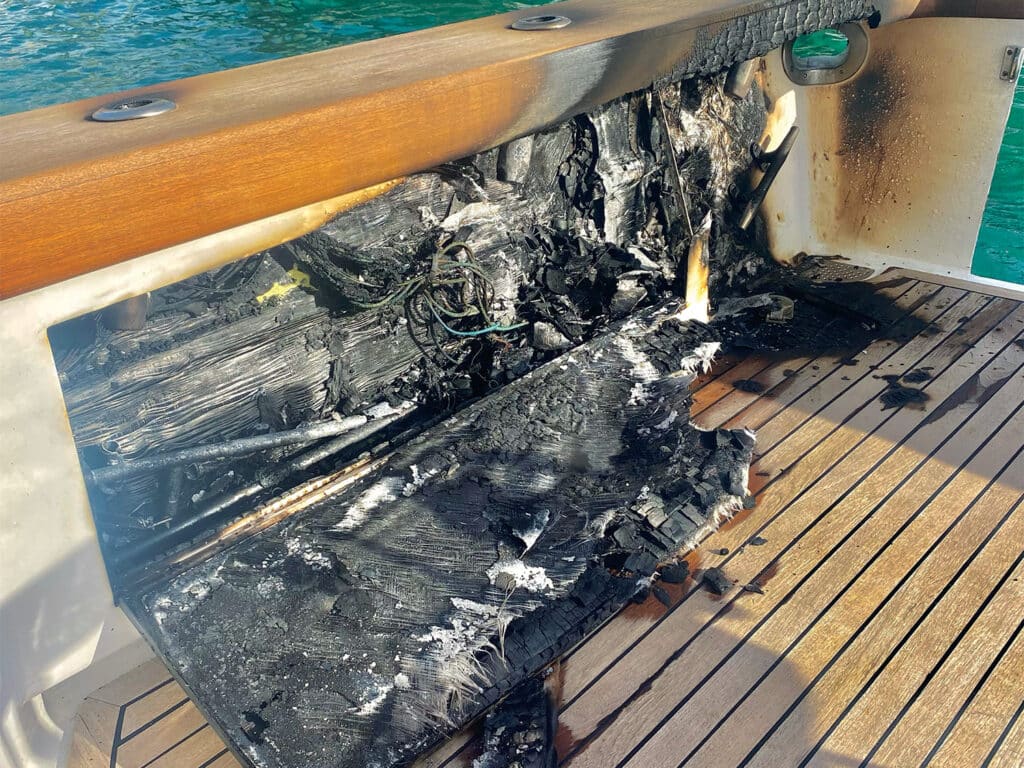
The Claim
Insurance. We must have it but pray that we never have to use it. I have been traveling and fishing in many remote locations during my 20-year professional career as a captain and never had to make any kind of insurance claim. Now here I was as a first-time boat owner, having to do so.
The out islands of the Bahamas aren’t exactly an easy place to get a surveyor to the boat quickly, but fortunately, the insurance company and underwriters worked fast, and within four days, a surveyor arrived, which was impressive given our remote location.
I was given quite a few stipulations from the insurance company, but the engines were running well, the sea trial went smoothly, and we made the 380-mile run in one day with the perfect weather window. While underway, I was inReach-texting three friends in Florida trying to find a boatyard that could get me hauled out. Even in the throes of the season, I was able to be hauled a few days later.
Once the fire inspector had determined the root cause of the fire for the insurance company—the power-cord end had created a hotspot that gave way and heated up, so much so that it caught the surrounding wood and fiberglass on fire—the cleanup began. Professional cleaning crews came in to remove as much soot and smell as possible, and I combed through every inch of the damage to find anything salvageable and everything that was damaged.
After a few weeks of obtaining quotes and communicating with the underwriters to evaluate the claim so that we could move forward with the restoration process, the boat was eventually back to perfect.
Read Next: Fire, sinking and medical emergencies are just a few of the things which can happen while offshore. Here are a few tips on how to handle them when the happen to you.
What I Learned
I am a firm believer in backups—even backups for backups. We had a lot of fire extinguishers on board, and thankfully, we also had 24-volt high-pressure water pumps, which shows how important my backups were at that point in time.
I also learned that insurance is exactly that: insurance. We have it just in case crazy things like this happen, and it’s meant to save us from a disastrous loss. Euphoria might not have been repaired without the insurance policy simply because I could not afford the restoration out-of-pocket.
When this unfortunate debacle was all said and done, I had learned a lot. First, the fine print in your policy is important! Read it thoroughly and understand it. Be sure you are in full compliance in regard to an up-to-date fire-suppression system and the Coast Guard requirements. Second, file a travel/float plan with your insurance company to let them know where you’re going and for how long, and be sure you’re cleared to do so before you depart. And third, be sure all of your safety equipment is inspected and in working order, and that you have the paperwork to back it up, including your Certificate of Documentation, registration, and a copy of the insurance policy.
There are some real horror stories out there when it comes to insurance companies declining claims due to some i’s not being dotted or t’s not being crossed. A good insurance broker goes a long way when you are faced with situations like I was. They are there to help—and, if necessary, go to bat for you throughout the process—and will alleviate much of the stress. After all, haven’t we had enough stress for one incident?
